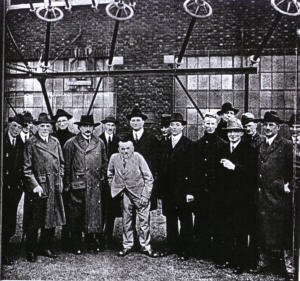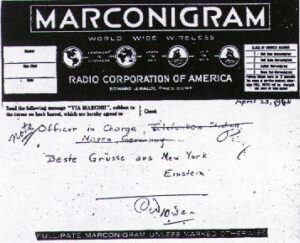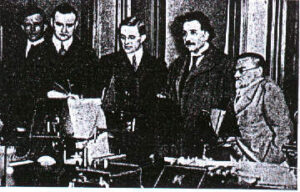The History of InfoAge Science & History Museums
RCA Ownership - Professor Einstein Looks Into Radio
Professor Albert Einstein, proponent of the world famous relativity theory with leading radio and electrical men at New Brunswick. Reading from left to right: David Sarnoff, Thomas J. Hayden, Dr. E.J.Berg, S. Benedict, Professor Albert Einstein, John Carson, Dr. C. P. Steinmetz, Dr. A. N. Goldsmith, A. Malsin, Dr. Irving Langmuir, Dr. Albert W. Hull, E. B. Pillsbury, Dr. Saul Dushman, R.H. Ranger, Dr. G. H. Campbell and C. H. Taylor

Facsimile of radiogram sent by Dr. Albert Einstein to Nauen, Germany – Translation: "Good Luck from New York Einstein"
Professor Einstein Looks Into Radio
PROFESSOR Albert Einstein, the world-famous discoverer of the theory of relativity, was entertained as the guest of the Radio Corporation of America, on April 23rd. At 9:30 in the morning he visited the company’s New York office at 64 Broad Street, where trans-Atlantic message traffic is centered, and was received by a distinguished committee, including Professor Steinmetz, Dr. Langmuir, Dr. Dushman and Dr. Hull, of the General Electric Co.; Dr. Campbell, Dr. Carson and Dr. Wilson, of the Western Electric Co.; Mr. Sarnoff, Mr. Winterbottom, Mr. Graham and Dr. Goldsmith, of the Radio Corporation of America.
Professor Einstein expressed great pleasure in having the opportunity of witnessing a demonstration of the effectiveness of the system of radio communication established by the Radio Corporation of America., and paid special attention to the operation of the duplex circuit to England. On this circuit, the transmitting and receiving operators sat side by side, one controlling with his key the New Brunswick transmitting station and the other receiving the signal from England, via Long Island, with, transfer of the received signals over wire lines, direct to the office in the heart of New York’s financial district. He wrote out a message to the officer in charge at Nauen. This was sent to Nauen, via the Radio Corporation station at Marion, Mass., and an answer was received at Chatham and relayed to the New York office.
The typewritten answer was handed to Professor Einstein in a little over five minutes after he had written the original message; and all this was done with such facility and freedom from excitement that the distinguished guest, in his pleasantly humorous way, remarked that he could scarcely believe that the message had actually been sent and a bonafide answer received.
Professor Einstein was then taken to the New Brunswick Station and entertained at luncheon, after which short complimentary speeches were made by Professor Steinmetz, Dr. Langmuir and Dr. Goldsmith. The guest was then shown the New Brunswick transmitting station in operation and he made a careful study of the circuits and antenna arrangements, displaying an amazing grasp of the function of every portion of the equipment. The self-centering system for holding centered the huge masses -of the spinning rotors of the alternators interested him greatly, as did also the delicate speed control which holds the Alexanderson alternator accurate in speed to better’ than 1/20th per cent.

Dr. Albert Einstein and other noted scientists watching a demonstration of automatic high speed transoceanic radio communications at the New York office of the Radio Corporation of America. Left to right: Dr. G. H. Campbell, Dr. A. N. Goldsmith, W. A. Winterbottom, Dr. A. Einstein and Dr. C. P. Steinmetz.
During the walk under the multiple tuned antenna, Professor Einstein showed considerable interest in the intense electric fields in the neighborhood of the lead-in. He was amused at the fact that persons in this neighborhood could draw sparks from each other, indicating clearly the tremendous amount of energy available, and he reserved a few special humorous remarks for the struggles of a photographer whose camera sparked in his fingers every time he tried to make an exposure.
Webeditor note: By 1921 advances in aerial technology had made the Belmar Marconi receiving station technically obsolute. Otherwise, they would have take Professor Einstein to view the beautiful shores of the Shark River while he enjoyed lunch. The Belmar station was sold in 1924 by RCA. The New Brunswick station was in service into the 1950s. As of 2003 only one cottage remains. In 2000 we were allowed to salvage as much as we could strip from the New Brunswick buildings before they were demolished to make room for a storage business. The transmitting station power plant pictured above had been replaced by a McDonalds and Dunkin Donuts years before.
Page created March 31, 2001
We Need Your Help! Volunteer with Us.
Join our mission to preserve historic Camp Evans and teach the public about science and history.
Sign up to join our team of volunteers and start on your own mission today.
InfoAge Science & History Museums
2201 Marconi Road
Wall, NJ 07719
Tel: 732-280-3000
info@infoage.org
webmaster@infoage.org

